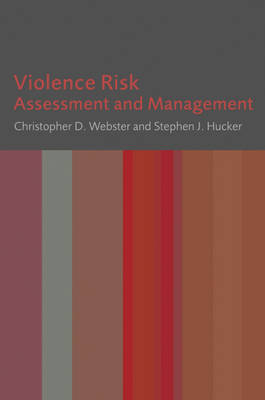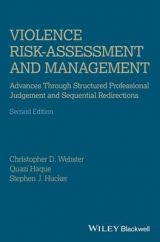
Violence Risk
John Wiley & Sons Ltd (Verlag)
978-0-470-02749-3 (ISBN)
- Titel erscheint in neuer Auflage
- Artikel merken
The decision to release someone from psychiatric hospital, forensic services or prison is often controversial, and forensic psychologists play a key role in assessing the risk of recidivism. In "Violence Risk", Chris Webster and Steve Hucker discuss the accuracy of prediction and highlight how violence assessments would improve if well-established findings became entrenched in clinical and research practice. Although the authors write the majority of the text, specialist colleagues add essential material on subjects such as averting spousal assault, sex offending, and improving community support.
Christopher Webster received his Ph.D. in Experimental Psychology from Dalhousie University in 1967. After a few years as a Research Scientist at the then Addiction research Foundation in Toronto, he moved to the Clarke Institute of Psychiatry and coordinated research and clinical programs for children with severe developmental and conduct problems. In 1975 he was appointed Professor and Director of the School of Child and Youth Care at the University of Victoria. Returning to Toronto after a few years, he was again appointed a research Scientist at the Clarke Institute and also Professor of Psychiatry, Psychology, and Criminology. It was during this period that he developed antitrust in forensic mental health, with emphasis on violence risk assessment and treatment. In 1993, he was appointed Professor and Chair of the Department of Psychology, Simon Fraser University in Burnaby, British Columbia. There he continued to develop his interests in structured professional judgment(SPJ) approaches to risk assessment in collaboration with Kevin Douglas, Stephen Hart, Derek Eaves, Randy Kropp, Deborah Ross, Henrik Belfrage, Rudiger Muller-Isberner, Jim Ogloff, and many others. returning to Toronto in 1997, he has continued to work with his colleagues in British Columbia, but formed new alliances with Mary-Lou Martin at St. Joseph's Healthcare in Hamilton, Ontario, and Johan Brink and Tonia Nicholls of the Forensic Psychiatric Services Commissions of British Columbia. Work on SPJ projects in Toronto over recent years owes much to Leena Augimeri, Chris Koegl, and Hy Bloom, He is a Fellow of the Canadian Psychological Association, the American Psychological Association, and the Royal Society of Canada. At Simon Fraser University he is Professor Emertius of Psychology, and at the University of Toronto, he is Professor Emeritus of Psychology, and at the University of Toronto, he is Professor Emeritus of Psychiatry. Stephen Hucker obtained his medical and psychiatric qualifications in the United Kingdom before completing his forensic psychiatric training at the Clarke Institute of Psychiatry in Toronto. He was Head of the Forensic Programme there from 1982 until 1993 and then spent five yearrs as Professor of Psychiatry, Psychology Professor of Psychiatry at McMaster University and Head of Forensic Services at St. Joseph's Healthcare in Hamilton, Ontario. Over the years Dr. Hucker has conducted research on a number of forensic psychiatric topics, has lectured widely to scientific and professional audiences across North America as well as in Great Britain and Australia and has conducted many administrative reviews of forensic and correctional facilities. He also maintains a busy forensic psychiatric practice and is frequently called upon to provide an opinion to defense lawyers and prosecutors, community agencies and parole boards, and often testifies as an expert witness. In all these circumstances he has gained extensive practical experience in risk assessment and management. Dr. Hucker has been Professor of Psychiatry t the University of Toronto Since 1998 and he resumed his affiliation with the Centre of Addiction and Mental Health in the Law and Mental Health Programme in 2005.
About the Authors.List of Contributors.Foreword.Preface.Acknowledgments.1 Laws.2 Philosophies.3 Predictions.4 Errors.5 Disorders.Childhoods.Psychoses.Moods.Substances.Impulses.Perversions.Personalities.Concussions.6 Psychopaths.7 Studies.Metropolitan Toronto Forensic Service Oak Ridge, Penetanguishene Mental Health Centre MacArthur.8 Baserates.9 Factors.10 Debates.11 Guides.A Retrospective HCR-20 Analysis of One Man's Account of Self-Admitted Extreme Dysfunction and Violence (Patricia Stefanowska, Christopher D. Weber, and Randy Starr).12 Competitions.13 Assessing Sex Offenders (R. Karl Hanson).14 Spousal Assaulters (P. Randall Kropp).15 Interventions.16 Transitions (Mary-Lou Martin).17 Teams.18 Communications.19 Experts.20 Conclusions.Questions.References.Index.
| Erscheint lt. Verlag | 19.1.2007 |
|---|---|
| Verlagsort | Chichester |
| Sprache | englisch |
| Maße | 163 x 232 mm |
| Gewicht | 446 g |
| Einbandart | gebunden |
| Themenwelt | Geisteswissenschaften ► Psychologie ► Klinische Psychologie |
| Recht / Steuern ► Strafrecht ► Kriminologie | |
| Sozialwissenschaften ► Pädagogik ► Sozialpädagogik | |
| Sozialwissenschaften ► Soziologie | |
| ISBN-10 | 0-470-02749-5 / 0470027495 |
| ISBN-13 | 978-0-470-02749-3 / 9780470027493 |
| Zustand | Neuware |
| Haben Sie eine Frage zum Produkt? |
aus dem Bereich



